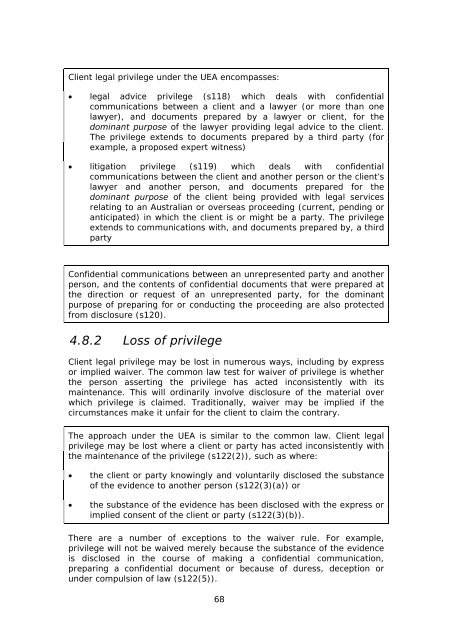Introduction to the UEA - Victorian Law Reform Commission
Introduction to the UEA - Victorian Law Reform Commission
Introduction to the UEA - Victorian Law Reform Commission
Create successful ePaper yourself
Turn your PDF publications into a flip-book with our unique Google optimized e-Paper software.
Client legal privilege under <strong>the</strong> <strong>UEA</strong> encompasses:<br />
• legal advice privilege (s118) which deals with confidential<br />
communications between a client and a lawyer (or more than one<br />
lawyer), and documents prepared by a lawyer or client, for <strong>the</strong><br />
dominant purpose of <strong>the</strong> lawyer providing legal advice <strong>to</strong> <strong>the</strong> client.<br />
The privilege extends <strong>to</strong> documents prepared by a third party (for<br />
example, a proposed expert witness)<br />
• litigation privilege (s119) which deals with confidential<br />
communications between <strong>the</strong> client and ano<strong>the</strong>r person or <strong>the</strong> client’s<br />
lawyer and ano<strong>the</strong>r person, and documents prepared for <strong>the</strong><br />
dominant purpose of <strong>the</strong> client being provided with legal services<br />
relating <strong>to</strong> an Australian or overseas proceeding (current, pending or<br />
anticipated) in which <strong>the</strong> client is or might be a party. The privilege<br />
extends <strong>to</strong> communications with, and documents prepared by, a third<br />
party<br />
Confidential communications between an unrepresented party and ano<strong>the</strong>r<br />
person, and <strong>the</strong> contents of confidential documents that were prepared at<br />
<strong>the</strong> direction or request of an unrepresented party, for <strong>the</strong> dominant<br />
purpose of preparing for or conducting <strong>the</strong> proceeding are also protected<br />
from disclosure (s120).<br />
4.8.2 Loss of privilege<br />
Client legal privilege may be lost in numerous ways, including by express<br />
or implied waiver. The common law test for waiver of privilege is whe<strong>the</strong>r<br />
<strong>the</strong> person asserting <strong>the</strong> privilege has acted inconsistently with its<br />
maintenance. This will ordinarily involve disclosure of <strong>the</strong> material over<br />
which privilege is claimed. Traditionally, waiver may be implied if <strong>the</strong><br />
circumstances make it unfair for <strong>the</strong> client <strong>to</strong> claim <strong>the</strong> contrary.<br />
The approach under <strong>the</strong> <strong>UEA</strong> is similar <strong>to</strong> <strong>the</strong> common law. Client legal<br />
privilege may be lost where a client or party has acted inconsistently with<br />
<strong>the</strong> maintenance of <strong>the</strong> privilege (s122(2)), such as where:<br />
• <strong>the</strong> client or party knowingly and voluntarily disclosed <strong>the</strong> substance<br />
of <strong>the</strong> evidence <strong>to</strong> ano<strong>the</strong>r person (s122(3)(a)) or<br />
• <strong>the</strong> substance of <strong>the</strong> evidence has been disclosed with <strong>the</strong> express or<br />
implied consent of <strong>the</strong> client or party (s122(3)(b)).<br />
There are a number of exceptions <strong>to</strong> <strong>the</strong> waiver rule. For example,<br />
privilege will not be waived merely because <strong>the</strong> substance of <strong>the</strong> evidence<br />
is disclosed in <strong>the</strong> course of making a confidential communication,<br />
preparing a confidential document or because of duress, deception or<br />
under compulsion of law (s122(5)).<br />
68

















